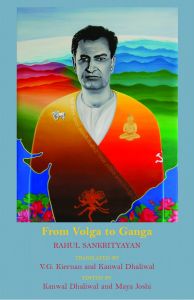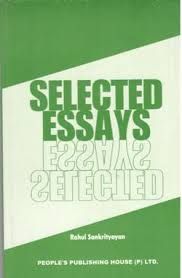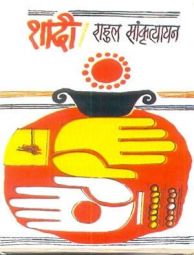Rahul Sankrityayan

Rahul Sankrityayan
Rahul Sankrityayan (1893–1963) was an Indian polymath who is often remembered as the father of Hindi travel writing. He was also known for his role in the revival of Buddhism in India, as co-founder of the Bihar unit of the Communist Party, and a pioneering explorer-traveller. His choice of Hindi for the bulk of his writing marks him as a contributor to a popular progressive intellectual discourse in that language. Apart from his iconic travelogues that record journeys into remote Himalayan regions and across Asia and Europe, he wrote on travel (Ghumakkar Shastr), made significant contributions to history (including the Sahitya Akademi Award winning Madhya Asia ka Itihas), philosophy (Darshan Digdarshan), memoir-writing (Meri Jeevan-Yatra, Mere Asahyog ke Saathi), polemics (Bhago Nahin Duniya ko Badlo, Tumhari Kshaya), biography (of travellers, thinkers, social reformers, political leaders), drama (Bhojpuri), translation (of Tajik novels, as well as The Communist Manifesto), lexicography, critical commentary on and emendation of rare Buddhist philosophical texts recovered from Tibet, and diverse fiction, mostly historical. He was imprisoned for his anti-colonial activism for about three years by the British. In 1963, he was conferred the Padma Bhushan.
-
 From Volga to GangaINR 595
From Volga to GangaINR 595Rahul Sankrityayan (1893–1963) was a polymath and polyglot. A pioneering explorer-traveller, he is known not only for his travelogues but also for contributions to history, philosophy, memoir-wri...
-
 Selected EssaysINR 150
Selected EssaysINR 150Rahulji was a phenomenon and his quest for knowledge phenomenal. His discoveries of several hundreds of important ancient Sanskrit and Buddhist works were without par...
-


Badri Raina
Badri Raina is a well-known commentator on politics, culture and society. His columns on the Znet have a global following.
Raina taught English literature at the University of Delhi for over

Peter D. Thomas
Peter D. Thomas (Ph.D, 2008) studied at the University of Queensland, Freie Universität Berlin, L’Università “Federico II”, Naples, and the Universiteit van Amsterdam. He has published wide

Jim Powell
N/A
M. Swaminathan
N/A
Deborah Wyrick
N/A
Kancha Ilaiah Shepherd
Kancha Ilaiah Shepherd recently retired as Director, Centre for the Study of Social Exclusion and Inclusive Policy, Maulana Azad National Urdu University, Hyderabad. He is Chairman of Telangana Mas
